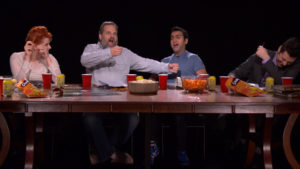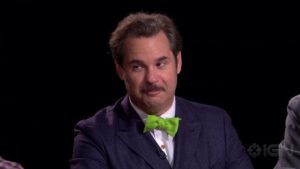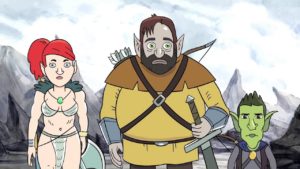9. HarmonQuest
HarmonQuest and the Laughter We Hope to Stumble On
The more I try to configure my mind around all the different ways this show avoids falling miserably, the more I realise how difficult it must have been to sell as a pitch to any serious financiers. Make no mistake: there are very few concepts on television harder to imagine succeeding as this one, where a group of nerdy, probably liquored up comedians engage in a knock-off version of Dungeons & Dragons which, apart from the central questline itself, is completely spontaneous and relies upon the improvised humour of each participant to succeed. The results, after the fact, are then animated and interspersed with live action footage of the group in the midst of their role-playing, filmed in front of a live studio audience who seem equal parts amused and spellbound by the whole concept. Also, the dungeon master and chief creative vision behind the series, Spencer Crittenden, has virtually zero experience in television and the regular panel consists of three little-known faces outside of the alternative comedy scene, including Jeff B. Davis, renowned alcoholic and all-round unstable individual Dan Harmon and his recent ex-wife Erin McGathy. It’s like an elaborate dare that no one had the nerve or inclination to opt out of.

Ultimately, it’s to our good fortune that they didn’t, because holy fuck is this show hilarious, bracing and, somehow, strangely touching. There’s a lot of reasons for this, first and foremost being the strong selection of guest stars at HarmonQuest’s disposal, with each new installment featuring a well-worn comedy veteran that keeps things vibrant and interesting. Those who make the best impression are obviously practiced in fantasy role-playing and general nerdery which, without adopting a blanket view of gender demographics in these matters, tends to be the dudes. The stately John Hodgman adapts naturally to the environment, admitting that his passion for fantasy has always endeared him to the idea of D&D though he is typically adverse to “so much math”, while Silicon Valley’s Thomas Middleditch is the series MVP for bringing along his own fucking dice and playing with such gusto as to leave Crittenden awestruck (“This guy’s kicking ass!”).
Sometimes, however, it’s the absence of that very experience or preparation that yields the funniest results: Chelsea Peretti’s insouciant and kinda-over-it approach inserted into a fantasy realm is hilarious in the way you would expect from Brooklyn Nine-Nine’s Gina (“It’s drafty as fuuuck!”) and Aubrey Plaza’s typically droll, no-fucks-given attitude is a welcome salve to everyone’s enthusiasm, as she picks locks with her glasses and takes every opportunity to attack Davis for unclear reasons (“Why did you do that?!”).
The list of players goes on, each with their own specific virtues, including Steve Agee’s improvised ballads about dead babies, Kumail Nanjiani’s unapologetic scheming for more gold at every turn, Ron Funches’ deceptive gentle-giant geniality and, perhaps most memorable, Paul F. Tompkins’ questioning of the many inconvenient plot devices thrown their way, such as when the heroes are asked to defend a village during a restoration festival with a militia consisting of three soldiers:
Tompkins: “Wow! Where is the rest of the goddamned militia?!”
Crittenden: “They’re all on vacation.”
Tompkins: “During the restoration?! Who signed off on that?”

It would be a disservice not to mention what an asset the animation is to this format, providing a visual component to proceedings where typically all we’d have to follow along with would be our stupid imaginations. Starburns Industries, which animates for the show, has found a distinct style that suits the content perfectly, treating each character’s avatar as an opportunity for caricature mixed with mythological beings; compounded with a bold colour palette and hazy, unobtrusive backgrounds, the effect is reminiscent of a video game from early childhood, only adding to the sense of wonderment at play.
What truly can’t be overlooked, though, is the richness of the whole creative process Crittenden, Harmon and their cohorts engage in throughout. Each episode, Harmon refers to what they’re doing as collaborative storytelling, and he’s right: these strange, hilarious people are in the act of generating fiction while immersing themselves, and us, into it; this goes a long way to explaining why it feels so effortlessly compelling. It’s like a play with no agreed upon ending where you accept all deviations because the actors have such a good handle on it. For anyone familiar with Harmon’s work on Community and Rick & Morty, it’s fascinating to see him operating this way.

Harmon has always advocated for the monomyth when it comes to writing, a device that simplifies all narrative to the fundamentals of a hero’s journey. In making HarmonQuest, he seems to be simultaneously embracing and defying that embryo approach. If it functioned simply as a campaign-driven activity for its participants, the show would have little for us to attach onto, so the humour acts as an entrance point for the audience. There’s plenty of senseless meandering purely to make us laugh, which might seem to suggest that character arcs and other developments are besides the point, but Harmon and the rest of his panelists can’t help but sew the seeds for future payoffs. There’s McGathy’s penchant for having her character build bone sculptures which become an unlikely plot point (not to mention an incredible sight gag for the animation) but, most significantly, it’s Harmon’s character’s abandonment issues and cowardice that come full-circle by the final episode, featuring Nathan Fillion(!!!) and Matt Gourley. Such rounded storytelling, even in its loosest form, is what sets HarmonQuest apart and makes it more than a gleeful romp through the unexpected. It leads to a strange but not welcome sensation, where we find ourselves wondering exactly how we got to where we ended up even thought, in a way, it makes perfect sense.
2 Replies to “9. HarmonQuest”